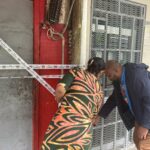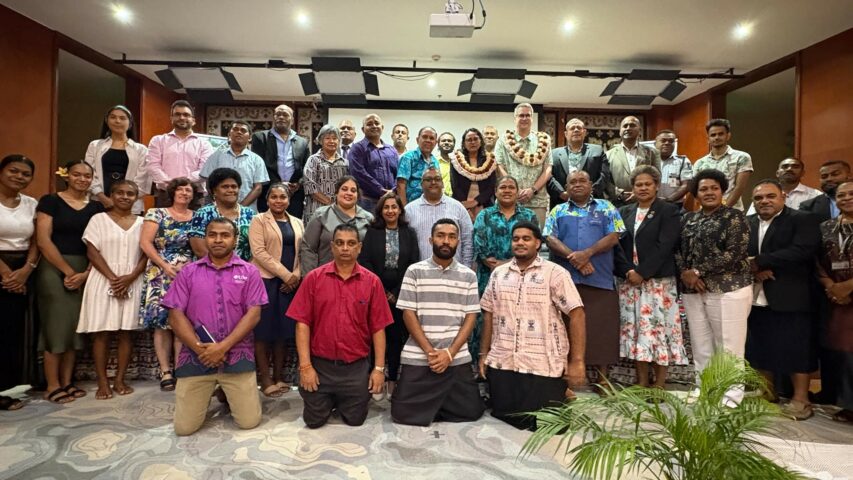
SUVA FAST FOOD JOINT SHUT DOWN OVER UNSANITARY CONDITIONS
May 9, 2025
Suva City Council Joins ACT to Boost Cooperation Among Pacific Capital Cities
June 4, 2025The Suva City Council today officially launched the Suva City Voluntary Local Review (VLR) Report 2025, a landmark achievement marking a historic moment in the city’s sustainable development journey. This makes Suva the first Pacific Small Island Developing State to produce a VLR, showcasing its leadership in localizing the Sustainable Development Goals (SDGs) and advancing inclusive urban planning.
The Suva VLR Report is the culmination of a collaborative effort under the Joint SDG Fund Accelerating Multi-Level Action for SDG Localization in Fiji Project. This initiative received crucial support from the Ministry of Local Government (MLG), the UN Resident Coordinator’s Office (UNRCO), UNESCAP, and UN-Habitat. This project represents a significant stride for Pacific cities and municipal councils, ensuring that global SDG commitments translate into tangible benefits for local communities.
The report meticulously highlights Suva’s progress and outlines strategic pathways toward achieving the SDGs. It reinforces the Council’s unwavering dedication to transforming global commitments into impactful local actions and fostering community engagement. Furthermore, the VLR creates a vital platform for new dialogues and enhanced stakeholder involvement.
In her opening address, Permanent Secretary for the Ministry of Local Government Seema Sharma shared her profound pride: “Today marks a proud moment not just for Suva, but for Fiji and the Pacific region. The launch of Suva City’s first Voluntary Local Review (VLR) represents a historic first for our nation and for the entire Pacific. This VLR demonstrates that our cities and towns are ready to lead on the global stage and to take bold, locally driven steps toward achieving the SDGs.”
Sharma extended her congratulations to the Suva City Council and its partners: “Let me begin by congratulating Suva City Council and our dedicated partners at UNESCAP and the Pacific Urban Partnership, for your vision, coordination, and leadership in bringing this review to life. This is a moment of great pride for all of us. Suva, as the hub of the Pacific, has long hosted the highest concentration of UN agencies, regional organizations, and diplomatic missions. It is therefore fitting that Suva now takes the lead in showcasing local action on sustainable development through this Voluntary Local Review. The Council’s leadership in convening these actors is commendable. The VLR reflects the aspirations and contributions of many—and more importantly, it provides a solid platform to shape the city’s future.”
UN Resident Coordinator for Fiji Dirk Wagener emphasized the significance of the VLR: “The Joint SDG Fund supported project on Accelerating Multi-Level Action for SDG localisation in Fiji marks a significant step forward for Pacific Cities and municipal councils in ensuring that global commitments to the Sustainable Development Goals (SDGs) translates into tangible benefits for its communities. The demand for an effective multi-level dialogue and cooperation has been essential to expand the centrality and effectiveness of SDG localization. VLRs have revamped multi-level dialogue and have made national governments more aware of localization and the impact of local data and initiatives on national reviews, policymaking and long-term vision.” policymaking and long-term vision.”
Mr. Tevita Boseiwaqa, Acting CEO of Suva City Council, echoed these sentiments, highlighting the shared vision for Suva’s sustainable future.
During the launch, experts and leaders delved into the report’s insights, discussing opportunities for cross-sector collaboration and addressing priorities outlined in the Greater Suva 10-Year Strategic Development Plan.
Fiji’s commitment to releasing a VLR in 2025 was initially promoted in the nation’s 2023 Voluntary National Review (VNR) report. This effort aligns seamlessly with Fiji’s experience in leading transformative processes. The Suva City VLR 2025, a collaborative effort supported by the Suva City Council (SCC), ESCAP, and the Pacific Urban Partnership, serves as a crucial tool for assessing progress and planning future actions in response to community aspirations and global sustainability frameworks.
By bringing together policymakers, community leaders, regulators, and financial actors, the Suva City Council anticipates today’s launch will catalyze actionable solutions to address sustainability challenges, promote inclusive growth, and strengthen the role of local governments in Fiji’s development agenda.
Scan the QR for SCC’s VLR:

Purpose of the Event:
The SCC Suva VLR document publication has been realised through the support of the Joint SDG Fund Accelerating Multi Level Action for SDG Localization in Fiji Project, with the support of Fiji’s Ministry of Local Government (MLG) in collaboration with the UN Resident Coordinators Office (UNRCO), the UN Economic and Social Commission for Asia and the Pacific (UNESCAP) and the UN-Habitat.
This launch event will formally introduce Suva’s 2025 VLR report, a comprehensive document that showcases our city’s progress on the SDGs and outlines our strategies for achieving them. The launch event also demonstrates Suva’s dedication to sustainable development and ensuring that global commitments translate into tangible benefits for our communities, including new dialogues and channels for engagement.
As part of the launch, the VLR report will be shared and the main findings and recommendations of the VLR will be presented.
The launch also includes a panel discussion comprising of invited key speakers. Discussions will focus on challenges and issues highlighted in the reports including the opportunities of collaboration and interventions within various tiers of government and society necessary for the Greater Suva’s 10 – year strategic development plan.
The Council hopes hope that it will bring together key stakeholders, policymakers, community representatives, regulators and financial actors, the discussions will contribute to shaping actionable solutions to bridge the sustainability challenges and gaps for SCC and the local government sector.

